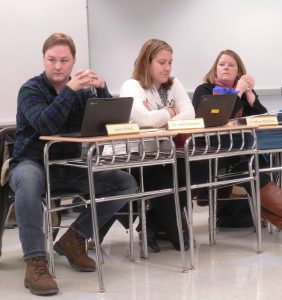HUNTINGTON – The Gateway Regional School Committee presented an FY19 line item budget to representatives of the member towns at a joint budget session on Wednesday. Gateway Superintendent Dr. David B. Hopson said it was a “vast change in the way we do business.”
He said over the course of the last couple of months, the administration had sat down together to prioritize needs not included in the budget and discuss them with the towns. “We don’t anticipate everyone will be happy with a $700,000 increase to the budget,” he said.
Hopson then laid out the top prioritized needs, according to his team. He said at the top of the list was moving pupil services director Kurt Garivaltis to full-time. Garivaltis, who is in charge of the special education program for the district is only working 205 days, Hopson said. “There is a lot more he could do. One of MARS (Mass. Assoc. of Retired Superintendents) recommendations was to move the administration to full time, but when discussed, we all agreed Kurt should go full time,” he added.

Huntington School Committee members Aaron Welch and Melissa Nazzaro and Lyndsey Papillon of Russell listen to town officials during joint budget session. (Photo by Amy Porter)
MARS consultants are currently facilitating long-term joint planning sessions with the district and town representatives.
Hopson said some of the other prioritized items in the FY19 budget were a part-time curriculum director; a full-time secretary split between multiple schools, a literacy consultant and/or coach (targeting literacy is a main goal of the district); and the purchase of a new van to transport students to programs, which results in transportation savings for the district.
“Literacy has so many components to it; we over the years have dabbled in so many programs. It’s not cohesive. (We have) a lot of work to get everyone on board and working in the same direction. Having someone on board would be a resource for teachers. It would be helpful to tighten up our instructional practices,” said Chester/Littleville principal Megan Coburn, when asked to explain the literacy position.
Chester Finance Committee member Andrew Myers complimented the administration for sending out the information. “Looking at the numbers, with a $209,000 increase for level services, it adds up to almost a $1 million increase. We’re way off with charts here, as far as that goes. Looking at promotional items, they’re all good items. The towns are economically strapped, and can’t afford more dollars,” Myers said.
The level services increase of $209,000 to which Myers referred reflects the increased costs of keeping the same programs as this year. Some of the increases are in negotiated steps for teachers, health care insurance and gas hikes.
Hopson said there are also some additional positions included, such as another kindergarten teacher in Littleville who they must hire if there are more students next year, and academic coaches. He said the curriculum position, another MARS recommendation, would be half or part-time, or hired as a consultant. He said there is the potential for sharing the position with another district.
Myers said that Chester Board of Selectmen chair John Baldasaro had called for a level funded budget.
Hopson said a level funded budget in the school would not necessarily be level funded for the towns, (whose assessments are based on a number of factors including percentage share of students) and would cut $210,000 from the budget. “Where do you expect us to cut $210,000 and maintain services to students? We’re kind of bare bones,” Hopson said.
“We’ve got to live with what we’ve got. We can’t spend what we don’t have,” Myers said.
“Even with keeping just what we have now, there are increases in health insurance,” said Russell School Committee member Lyndsey Papillon. Tara Balboni, also representing Russell, said she had seen emails exchanged in the towns about sharing positions, and suggested the towns also do their part.
“In town, there are no high paid positions. We can’t just say ‘combining positions’ if they’re elected positions. We’re going to have to convince citizens to change from elected to appointed,” said Chester Selectman Barbara Huntoon.
“I’ve heard these things over and over again. You don’t turn the Titanic overnight. Cutting $250,000 is not the way to attract more families – it’s going to make things a lot worse,” said Huntington School Committee member Melissa Nazzaro.
“We’re not going to get there through just cutting,” Myers said, adding that the Hilltown Collaborative, which he chairs, plans to apply for a $10-$12,000 grant for a state of the art computer classroom for more online learning.
“Holding things still until we figure this out to me is not acceptable. If we’re talking community and townspeople having a better relationship, if we could decide as a group that level funding is not acceptable and if we could agree on an approach that would start with level service. Can we agree to start with level service, then (decide) how much we could stomach adding to level service,” asked School Committee chair Michele Crane of Blandford.
“The bottom line is if we hit Russell with another couple hundred thousand, they’re not going to approve it,” Myers said.
“We’re talking short term to long term problems,” McVeigh said.
“We’ve been in this facilitated process for four months now. My frustration is that we have a budget here, and we’re already in (long-term discussions). My goal is at every town meeting, the Finance Committees recommend the towns pass the budget. How can we get there?” asked Huntington School Committee member Aaron Welch.
Hopson said that one of the recommendations from the state is to be a pilot program for leveling assessments to the towns. He suggested asking DESE (Department of Elementary and Secondary Education) to set Gateway up as the pilot. That would mean if there is a 1% increase in the budget, all the towns would get the 1% increase, he said.
“How can the towns agree to an assessment when we don’t know what it is?” Myers asked. Huntington selectman Darlene McVeigh said the governor’s budget, which will come out later this month, will give the towns an idea of revenue streams. “The revenues are critical in order for the towns to discuss this further with you,” McVeigh said.
“The question has always been, can the towns afford the budget,” Hopson said, adding one of the difficulties with the system is that the School Committee has to vote on a budget in March, and the state budget is often not decided until the end of June. “For me, this is great dialogue. This is the most dialogue we’ve had about the budget in years,” he added.
Hopson agreed to look into having Gateway become a pilot for leveling assessments. The School Committee agreed to further explain some of the increases in the budget, for the towns to better understand the whole picture. Thursday, many of the same representatives were scheduled to meet in the facilitated discussion with MARS consultants to go over joint long-term planning for the district and the towns.






